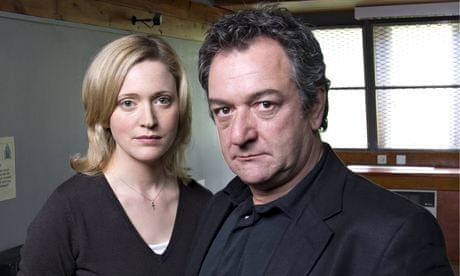Crime writers should depict more detectives as clean-living and balanced rather than damaged and hard-drinking like the Inspector Rebus of Ian Rankin's novels, a chief constable has said.
Nick Gargan, chief constable of Avon and Somerset, said some police officers modelled themselves on fictional cops when they were interviewed on television in high-profile cases.
Speaking to the Guardian before a talk on crime fiction at the Chipping Norton literary festival at the weekend, Gargan said: "I've seen cops on the steps of court putting in rather theatrical performances for the TV cameras and I've thought: you weren't trained to do that. It doesn't represent any part of the rest of your working life. You've thought, tomorrow morning I'm likely to appear on the steps of the court, I'll be expected to say something. What are my reference points, how am I going to come across?"
Gargan said he accepted Rankin's view that a novel giving a realistic portrayal of police procedure would be "the most boring book in the world", but objected to crime authors depicting one detective doing the work of what in reality would be that of up to 40 officers.
"You see a Rebus or Morse at the scene, recovering forensic exhibits, interviewing the suspect, comforting the family, arguing with the chief constable about resources. What can be a team of 20, 30 or 40 people is concentrated in the person of this one senior investigator," he said.
Gargan, who worked on the investigation into Princess Diana's death, said he did not accept the accuracy of another trait of fictional detectives – bending the rules for the greater good. "Do we have hard-drinking, heavy-smoking cynical people who make a few mistakes? Yes. But this slightly heroic bucking-the-system thing, I don't think we have much of that."
He said Rankin's beloved creation would not like him. "I represent everything at the top end of the organisation that he's contemptuous of, and I understand that.
"There are some pretty damaged individuals in too many of these books. I'd quite like to see some cheery, well-balanced, well-adjusted, equally successful investigators. I'd hate to think our investigators were modelling themselves on Rebus, but I think a few of them modelled themselves on Frost [RD Wingfield's creation Jack Frost, played on television by David Jason in A Touch of Frost]. You get a bit of Morse too."
A senior detective in a neighbouring force, Steve Fulcher of Wiltshire police, was disciplined recently for breaking the rules on how a suspect should be questioned during the high-profile murder case of Sian O'Callaghan in Swindon.
In a scene that could have come from a crime novel (and Rankin has said Rebus might have acted in the same way), Fulcher questioned a suspect, Chris Halliwell, on a remote hillside without access to legal advice in a desperate attempt to crack the case. Halliwell admitted murdering O'Callaghan and led Fulcher to the body of a second woman who had vanished some years earlier. Fulcher was feted by some and criticised by others.
"The rules and laws are there for a reason," Gargan said. "It's not heroic to step outside the law. We shouldn't do that. We're the police."
He said real-life detective work attracts interesting personalities. "In the world of investigation there are some real characters. It's a magnet to individuals."
He said crime writers did the police a disservice when they suggested officers had a propensity to corruption and were willing to break the rules. "But does that really shape people's perception of policing? I think people's experience of policing tends to be shaped by what has happened to them and their friends."
As to whether it mattered whether writers got the forensic details right, Gargan said it wasn't important unless there were jarring inaccuracies. He said that as a young constable he and his colleagues would watch episodes of The Bill and tick off the procedural errors. "But it's the quality of the writing, the story that matters."
Which detective novels would he take on holiday if forced to leave behind his management tomes and biographies? Gargan discounted Sherlock Homes and Agatha Christie – too much toxicology. Neither had he got into gruesome Scandinavian crime fiction. "There's a rather depressing amount of pathology now," he said.
"I'd take a Rumpole of the Bailey. It's such good fun. I'd probably take an earlier Ian Rankin. I'd take a Colin Dexter too, a nice Morse."








Comments (…)
Sign in or create your Guardian account to join the discussion